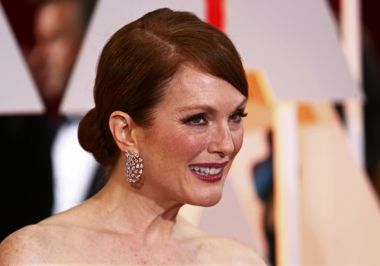Oscar night sees top acting awards go to moving portrayals of illness

Eddie Redmayne won his first Oscar on Sunday for his break-out role as physicist Stephen Hawking in the biographical movie 'The Theory of Everything'.
The British actor, 33, took home the Academy Award for best actor for playing Hawking and the disabling complications of a motor neurone disease, known as Lou Gehrig's disease or ALS, over the course of 30 years.
The Oscar came as little surprise following Golden Globe, SAG and British BAFTA trophies for his performance, which catapulted Redmayne from a relative unknown in Hollywood to its newest and most modest star.
"I am fully aware that I am a lucky, lucky man," Redmayne said as he held the gold statuette on stage. "This belongs to all of those people around the world battling ALS."
Redmayne spent seven months preparing to play Hawking, mastering his physical decline into almost total paralysis as well as his dry wit, mischievous glint and lady's man charm. He met the author of 'A Brief History of Time' just days before filming began.
Hawking, now 72, gave his blessing to the film, even though it is based on the memoir of first wife Jane who married the young genius when he was given two years to live.
Before 'The Theory of Everything', Redmayne was best known as an up-and-coming actor in movies such as 'My Week with Marilyn' and the musical 'Les Miserables', in which he played the rebellious young lover, Marius.
Redmayne has also worked as a Burberry clothes model, and he topped the 2015 list of GQ's magazine's 50 best-dressed British men.

Julianne Moore won the best actress Oscar for her role as a university professor with Alzheimer's disease in 'Still Alice'.The win marked Moore's first Academy Award after being nominated four times previously. The 54-year-old actress was favoored to win this year's prize after picking up Golden Globe, Screen Actors Guild and BAFTA awards earlier this year.
"I read an article that said that winning an Oscar could lead to living five years longer," Moore said while accepting her award. "If that's true I'd really like to thank the Academy because my husband is younger than me."
In 'Still Alice', the veteran actress plays a brilliant lecturer who is diagnosed with Alzheimer's disease at 50. The small budget film was picked up for distribution by Sony Pictures only in September, thanks to Moore's award-winning potential.
Last year, she said she was attracted to the role because she had never seen Alzheimer's portrayed from the point of view of the patient.
The film was adapted from the novel 'Still Alice' by Lisa Genova and was directed by Richard Glatzer and Wash Westmoreland.

Meanwhile, the dark comedy 'Birdman' held up a mirror to Hollywood and its struggling actors and in return received the film industry's highest recognition on Sunday, the Academy Award for best picture.
Director Alejandro Inarritu's story of a washed-up, former superhero actor attempting an improbable comeback on Broadway won four Oscars in its nine nominations, including best director, the second consecutive win in that category for a Mexican filmmaker.
Each of the eight best picture nominees went home with at least one award, but it was a disappointing night for "Boyhood," Richard Linklater's unprecedented 12-year endeavour to depict the simple story of a boy growing up, using the same actors. It won one Oscar out of its six nods.
Wes Anderson's colourful caper, 'The Grand Budapest Hotel' proved popular among the 6,100 members of the Academy of Motion Picture Arts and Sciences who vote for the Oscars, winning four awards on its nine nominations.
'Whiplash', the independent film about an aspiring jazz drummer and his tough mentor from young director Damien Chazelle, won three Oscars.
The only box office blockbuster among the eight, the Iraq war drama 'American Sniper' from director Clint Eastwood, also fell short with one win.
It was a night in which the controversy over the lack of diversity among this year's nominees was front and center. First-time host Neil Patrick Harris opened the telecast with a quip: "Tonight we honor Hollywood's best and whitest, sorry brightest."
But the race theme resonated in a more serious way too, when Common and John Legend got a standing ovation and made many in the audience cry with their performance of 'Glory' from the 1960s civil rights drama Selma'.
It won best song, delivering the sole victory to the film at the center of the diversity debate sparked by the exclusion of actors of colour from the four acting categories. The nominations prompted a backlash on Twitter with the hashtag "#OscarsSoWhite.
Best documentary went to 'Citizenfour', director Laura Poitras' feature about National Security Agency whistleblower Edward Snowden, the former government contractor who detailed the secret mass surveillance programs.
"The subject of 'Citizenfour', Edward Snowden, could not be here for some treason," joked host Neil Patrick Harris.











